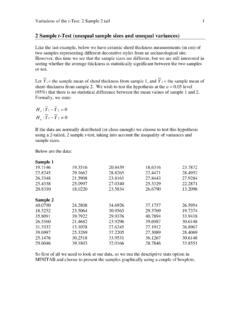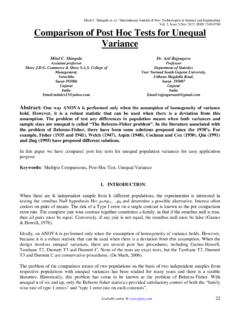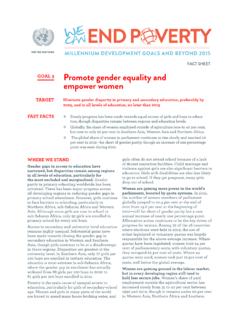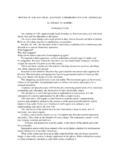Transcription of Lecture Harveian Oration Health in an unequal world - who.int
1 Vol 368 December 9, 2006 2081 Harveian OrationHealth in an unequal worldMichael Marmot William Harvey and the Harveian TrustWilliam Harvey was born in Folkestone on April 1, 1578. He was educated at the King s School, Canterbury, Gonville, and Caius College, Cambridge, and the University of Padua, graduating as doctor of arts and medicine in 1602. He became a Fellow of the Royal College of Physicians in 1607 and was appointed to the Lumleian lectureship in the cycles of his Lumleian lectures over the next 13 years, Harvey developed and refi ned his ideas about the circulation of the blood. He published his conclusions in 1628 in Exercitatio Anatomica de Motu Cordis et Sanguinis in Animalibus, which marks the beginning of clinical science.
2 In it, Harvey considered the structure of the heart, arteries, and veins with their valves. By carefully devised experiments and supported by the demonstration of the unidirectional fl ow of the blood in the superfi cial veins of his own forearm, he established that the blood circulated, and did not ebb and fl ow as had been believed for more than 1000 was a great benefactor of the College. In 1656 he gave his patrimonial estate of Burmarsh (in Romney Marsh, Kent) to the College to provide for the annual Oration and feast. In an indenture dated June 21, 1656, he directed that:to the end friendship between the members of the said College may be the better continued and maintained, there shall be once every month at the meeting of the Censors at the said College some small collation once every year there shall be a general feast kept within the said College for all the Fellows that shall please to on the day when such feast shall be kept some one make an an exhortation to the Fellows and Members of the said College to search and study out the secret of Nature by way of experiment.
3 And also for the honour of the profession to continue mutual love and aff ection amongst themselves without which neither the dignity of the College can be preserved nor yet particular men receive that benefi t by their admission into the College which else they might Sir Michael MarmotMichael Marmot is Director of the International Institute for Society and Health , and MRC Research Professor of Epidemiology and Public Health at University College London. He has been at the forefront of research into Health inequalities for the past 30 years. He is Principal Investigator of the Whitehall Studies of British civil servants, investigating explanations for the striking inverse social gradient in morbidity and mortality.
4 He leads the English Longitudinal Study of Ageing (ELSA) and is engaged in several international research eff orts on the social determinants of Health . With colleagues, he has a long-term research programme investigating the causes of Health disadvantages in the countries of central and eastern Europe and the former Soviet Union. He chairs the Department of Health Scientifi c Reference Group on tackling Health inequalities and the National Institute for Health and Clinical Excellence (NICE) Research and Development Committee. He also chairs the British Heart Foundation (BHF) Primary Prevention Committee and has been a member of the BHF Council since 2000.
5 He was a member of the Royal Commission on Environ mental Pollution for 6 years. He chairs the world Cancer Research Fund Panel on Food, Nutrition and Physical Activity and the Prevention of Cancer: a Global Perspective. In 2000, Michael Marmot received a knighthood for services to epidemiology and understanding Health in-equalities. Internationally acclaimed, he is a Vice President of the Academia Europaea, a member of the RAND Health Advisory Board, a Foreign Associate Member of the Institute of Medicine, and Chair of the Commission on Social Determinants of Health set up by WHO in 2005. He won the Balzan Prize for Epidemiology in 2004. Lancet 2006; 368: 2081 94 Published OnlineDecember 5, 2006 (06)69746-8 In poor countries, tragically, people die unnecessarily.
6 In rich countries, too, the higher death rate of those in less fortunate social positions is unnecessary. Can there be a link between these two phenomena: inequalities in Health between countries and inequalities within? Surely, we could argue, the depredations of grinding poverty inadequate food, shelter, clean water, and basic medical care or public Health that ravage the lives of the poor in developing countries are diff erent in kind from the way that social disadvantage leads to poor Health in modern Britain, for example. The diseases of the slums of Nairobi are, to be sure, diff erent in kind from the diseases that aff ect disadvantaged people in east London in the UK, or Harlem in the USA, and have diff erent proximate causes.
7 There is, however, a link. The unnecessary disease and suff ering of disadvantaged people, whether in poor countries or rich, is a result of the way we organise our aff airs in society. I shall argue, in this Oration , that failing This Lecture was presented at the Royal College of Physicians, London, UK, on Oct 18, 2006, and is published simultaneously in Clin Med 2006; 6: 559 College London, London WC1E 6BT, UK (Prof Sir M Marmot FRCP)Lecture2082 Vol 368 December 9, 2006 to meet the fundamental human needs of autonomy, empowerment, and human freedom is a potent cause of ill Health . In making this case, I shall bring together two rather disparate streams of work.
8 The fi rst is a report of my own research endeavour. I have sought explanations for the social gradient in Health , as observed in the Whitehall studies, pointing to the fundamental importance of the circumstances in which people live and work. I emphasise control and the opportunities for full social The second draws on the work of development economists Amartya Sen and Nicholas Stern. Sen suggests we should see development as freedom to lead the life people have reason to Stern s concept of empowerment is close to Sen s Without empowerment, argues Stern, economic growth will not bring improvements in Health and education as well as relief from poverty.
9 Both in the case of the social gradient in Health within countries and the diff erences in Health among countries, changing social conditions to ensure that people have the freedom to lead lives they have reason to value would lead to marked reductions in Health inequalities. In both cases the active involvement of individuals, and communities, in decisions that aff ect their lives is crucial. Drawing attention to the central role of human freedoms in Health is a statement of philosophical position and a call to social action. It is also based on a synthesis of a great deal of medical and social research. William Harvey, who established these orations, famously encouraged the orator to exhort the fellowship of this College to search out the secret of Nature by way of experiment.
10 For an epidemiologist, of course, Nature herself provides the experiments grand natural experiments. For this epidemiologist, Nature is in league with Society. Societies organise their aff airs in diff erent ways and these diff erences are the grand experiments that provide the researcher with the opportunity to search out the causes of Health and disease. I make the connection between social conditions and biological pathways that plausibly provide the link to cardiovascular and other diseases. I do not stop at biology, Harvey said that the feast and Oration should be not only to encourage scientifi c experiment but for the honour of the profession to continue mutual love and aff ection among themselves.















